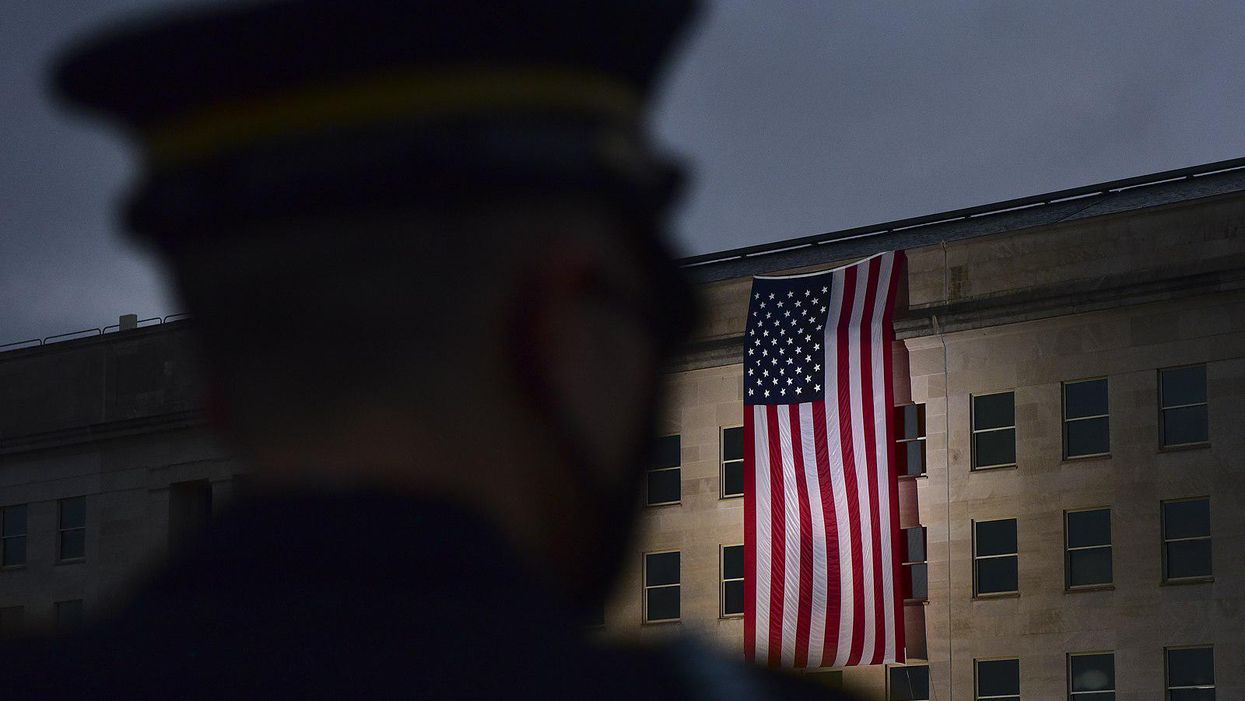
American flag unfurled at the Pentagon on the 19th anniversary of the September 11th attacks.
The 21st century in America has so far been bracketed by two terrible mass-casualty events. The first was the 9/11 attacks, 20 years ago today. The second is the COVID-19 pandemic. The radically different public response to these episodes reveals a lot about us, and much of it is not flattering.
The airline hijackings were the worst terrorist attacks in U.S. history. They catalyzed a wave of fear and anger that permanently reshaped our foreign and domestic policies — or, rather, warped them.
The near-panic that gripped the nation back then is understandable. But it's plain today that our leaders, with broad public support, grossly overreacted. The consequences afflict us even now.
No one could have imagined on September 10, 2001, that an American president would authorize the use of torture against alleged enemies in secret prisons. Or that hundreds of American Muslims would be arrested and detained without charges for days, weeks or months. Or that hostility toward Muslims would grow widespread enough to require a new term: Islamophobia. Or that the government would soon be collecting millions of records of phone communications — many of them in violation of the law.
Worse yet, though, were the two protracted wars the United States launched after the 9/11 attacks. The invasion of Afghanistan was a legitimate response, because the terrorist group behind the attacks had been operating there. But after toppling the Taliban and routing al-Qaida, we stayed on in a foolish quest to remake the country — a quest given up only recently.
Then there was the invasion of Iraq to topple Saddam Hussein. He had nothing to do with the attacks, which didn't stop President George W. Bush and those around him from using 9/11 as a pretext for war. Between Afghanistan and Iraq, the U.S. sacrificed more than 6,800 American lives and trillions of dollars. But the president who initiated them was rewarded with reelection.
All this came in response to attacks that cost fewer than 3,000 lives. This pandemic will kill more Americans than that in the next three days — on top of the 649,000 who have already died from COVID-19.
The risk to each of us is hundreds of times greater than the risk of being killed by terrorists ever was. But the spirit of unity that arose after 9/11 has been conspicuously absent in the face of the virus.
What accounts for the disparity? Americans may not be unique in finding it easier to rouse themselves against violent human enemies than against microbes that spread silently through the populace. Osama bin Laden was easy to hate. The pathogen, visible only under a microscope, doesn't stir the same primal fury.
The 9/11 attacks produced a pervasive alarm that vastly exceeded the real danger. The low mortality rate of COVID-19, by contrast, has been used to downplay the need for basic public health measures, such as vaccinations and face coverings.
Leaders matter, for better or worse. Bush used his bully pulpit to call for a "crusade" against "evil-doers," and soon was vowing action against an "axis of evil" consisting of North Korea, Iraq, and Iran. In hyping the threat of terrorism, he commanded broad support and little meaningful resistance.
President Donald Trump, however, used his office to minimize the risks posed by COVID-19 and undermine public health guidance from experts. In March 2020, he admitted to journalist Bob Woodward that he had deliberately downplayed the virus in the full knowledge of how dangerous it was.
Publicly, he compared it to the flu and repeatedly promised it would soon disappear. He refused to wear a mask in public, mocked the government's chief infectious disease expert, Dr. Anthony Fauci, and held indoor rallies in packed arenas.
Trump declared war not on foreign enemies but on Democratic governors such as Michigan's Gretchen Whitmer. His credulous followers soon came to see the pandemic as a hoax cooked up to keep Trump from being reelected.
Perhaps the best explanation for the sharply contrasting public reactions is that the war on terrorism caused a negligible inconvenience to the vast majority of Americans. COVID-19 demanded significant changes in how we live — and millions of people not only refused to cooperate but celebrated their defiance.
The measures deemed necessary to fight terrorism exploited our eagerness to hate our enemies, which we had no trouble doing. Those required to combat COVID-19 required us to love our neighbors. Somehow, that's a much harder sell.
Follow Steve Chapman on Twitter @SteveChapman13 or at https://www.facebook.com/stevechapman13. To find out more about Steve Chapman and read features by other Creators Syndicate writers and cartoonists, visit the Creators Syndicate website at www.creators.com
- White House: Bidens To Visit All Three Sites Of Sept. 11 Attacks ... ›
- On 9/11 Anniversary, Trump Will Do Ringside Chatter For A Boxing ... ›
- Believe It Or Not, Giuliani Once Had A Finest Hour ›








